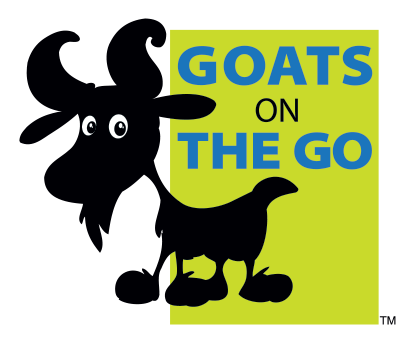Why Meat?
Note from Goats On The Go®’s founders: Not all Goats On The Go® affiliates produce meat from their targeted grazing operations, but for us it has always been a fundamental goal to produce excellent food for people in addition to delivering the benefits of goat grazing for vegetation management. The following article explains our view. If you have more questions, feel free to contact us at info@GoatsOnTheGo.com.
There are some goat rental services that pride themselves on never selling their goats for meat, touting that their herds exist exclusively for weed and brush control. We disagree with that approach and made a conscious decision to participate in meat production as well as targeted grazing. Here’s why:
We believe there is no other domestic livestock animal on earth that can so effectively convert low-quality feed into meat. Goats can glean nutrition from plants that other animals will not eat, on land that cannot (or should not) be used for other purposes. Most of the invasive plants that are plaguing North America’s landscapes are loved by goats, but ignored by sheep and cattle. When our goats are hired to eat these plants, several things happen:
The spread of invasive plants is halted, giving native plants and landscapes an opportunity to thrive.
Native landscapes support native wildlife, infiltrate storm water, reduce runoff of pollutants into bodies of water, prevent erosion, and sequester atmospheric carbon deep in the soil.
The use of chemical pesticides is dramatically reduced or eliminated, as is disruptive mechanization that burns fossil fuels and causes erosion. Reliance on prescribed fire as a management tool is reduced, along with its resultant exposure of erodible soils and HUGE release of carbon into the air.
Goats grow, producing meat that feeds people while giving far more to the world than it took in terms of resources and environmental impact.
And, speaking of people, the demand for meat from the world’s growing population is not going away anytime soon. A huge portion of people internationally and a growing portion domestically eat goat as their primary source of protein. If the U.S. can’t meet its own demand - and currently it doesn't - consumers will purchase imported goat meat, negating its environmental benefits. Or, more likely, they will seek out substitutes from other livestock that have greater environmental impact and only benefit the world at one point in their lives — when they become meat.
Goats can be produced with less environmental impact per pound than virtually any other domestic livestock, but that doesn’t mean zero impact. All agriculture impacts the environment in which it occurs. Thus, to return the greatest net benefit to the world, we believe we need to take advantage of the full upside of goats. That means our goats need to feed people, not just eat weeds.
Finally, operating a targeted grazing business in most parts of the U.S. is not likely to be profitable without the second income stream that comes from the sale of meat goats for food. Without profit, the business cannot exist, and it’s back to herbicides and mechanical equipment for vegetation management.
